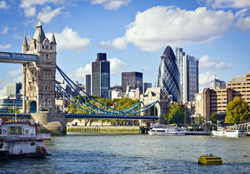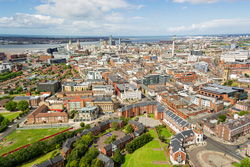Nowadays South Africans are looking offshore for investment opportunities to balance risk and take advantage of the current favourable exchange rate scenario.
 The improvement of the rand against sterling, plus the relaxation of exchange control, has resulted in a much more affordable investment strategy for people wanting to buy property in the UK.
The improvement of the rand against sterling, plus the relaxation of exchange control, has resulted in a much more affordable investment strategy for people wanting to buy property in the UK.“The property market fluctuates all the time here and timing is everything,” says Doyle. “What we have noticed is with the low interest rates, UK investors are looking for yields and this is having a massive effect on the property market. We predict a few years of opportunistic investing before the tide changes.”
He says regardless of the Brexit situation, the basic fundamentals are what drive the market. “The UK is an island, the government is not building enough affordable housing and the population is growing. Simply put it is a supply and demand issue.”
Doyle takes a look at why “now is the time to invest in the United Kingdom”.
Rate of exchange
The improvement of the rand against sterling, plus the relaxation of exchange control, has resulted in a much more affordable investment strategy for people wanting to buy property in the UK. A South African-based investor is now able to buy investment properties in high yielding areas for around R800 000 with gross yields of 9%.
It’s a buyer’s market
 Areas like Liverpool (pictured), Manchester and Birmingham are all seeing capital growth, with Liverpool currently undergoing immense regeneration.
Areas like Liverpool (pictured), Manchester and Birmingham are all seeing capital growth, with Liverpool currently undergoing immense regeneration.Affordable properties, high demands from buy-to-let investors and massive infrastructure upgrades are all having an effect on these regions. The high speed HS2 rail system from London to Birmingham will have a further positive impact on property prices and tenant demand in the Midlands and further North.
Interest rates
There are indications that UK interest rates will remain low (and might even drop further) in the years to come. This will result in investors looking at yielding assets like real estate. The competition in acquiring good yielding properties will increase in coming years, affecting capital growth.
Yields are driving the investments
The rush for investors to get maximum returns is having a huge impact on buy-to-let properties in the UK. Auction houses are seeing more people attending the auctions with many amateur investors starting to get onto the property ladder. Furthermore, the interest from the Chinese market is growing as they take more affordable sterling into their investment strategies.
South Africans are looking for solid currencies, countries that offer strong legal protection and investments with higher yields. The UK offers all these aspects.
Opportunities abound
 There has been a shift from mid-market properties in London (£450 000 to £750 000 range) to investing in much lower, entry-level values from £40 000 upwards. This is where the capital growth will occur in time.
There has been a shift from mid-market properties in London (£450 000 to £750 000 range) to investing in much lower, entry-level values from £40 000 upwards. This is where the capital growth will occur in time.There has been a shift from mid-market properties in London (£450 000 to £750 000 range) to investing in much lower, entry-level values from £40 000 upwards. This is where the capital growth will occur in time. Currently they are generating cash flows so the investors simply cannot lose.
Furthermore, people currently can’t afford to buy and deposits are higher and mortgages are more difficult to obtain. “Generation Rent” has effectively developed. Simply put the average age of the first-time buyer in the boom years was 26 years. It is now anticipated that the first-time buyer age will be 35-40 years by 2025. This means a massive increase in tenant demand in the middle class, tax-paying bracket.
Latest BREXIT challenges
There is no doubt that the June referendum has caused some concern and raised the investment risk profile of the UK. However, for the savvy investors this leads to opportunities. While nervous investors sell their properties, the wise ones are snapping them up.
Areas that you should be investing in now
Cities like Liverpool are undergoing immense regeneration. In fact, in the last few months two major schemes have been approved, a multimillion-pound commercial and retail development and the so-called Bootle Upgrade. The Bootle town centre investment framework includes plans for canal side bars and restaurants in an attempt to make the best use of resources that are already there, and challenge preconceptions about the town. The plan features 150 000 square feet of new office floorspace and a hotel; 15,000 sq ft of new and converted start-up space; a canal lined with bars, restaurants, canoe facilities, a small hotel, and 15 000 square feet of leisure space. There are also plans for an improved Bootle Town Hall complex, expanded higher education options, student accommodation, 80 new homes and apartments, a new healthcare centre for the community and a multi-storey car park.
Typical type of investment that South Africans are buying
Entry levels, character Victorian or Edwardian buildings separated into flats and totally upgraded are advised. These tend to be one or two bedroom flats, which generate net yields of between 6%-7% and over a 5-year period with capital growth, are exceeding 12%-15% per annum. The properties should be in regeneration areas and close to transport links.
Anthony Doyle and Craig Illman from Propwealth will be in Cape Town, Johannesburg and Durban, from 24 November until 1 December 2016. They will be launching a series of new buy-to-let property opportunities yielding 9% gross in both London and Liverpool.
For more information, send an email or visit www.propwealth.co.uk.








